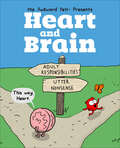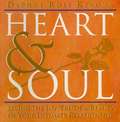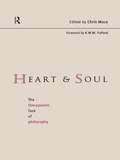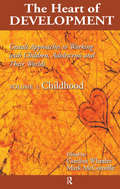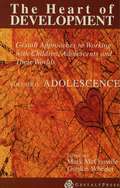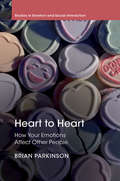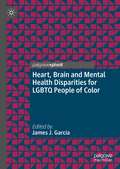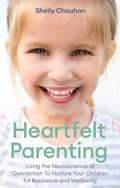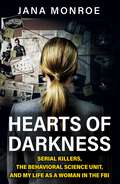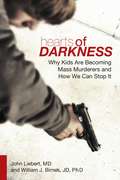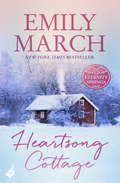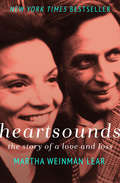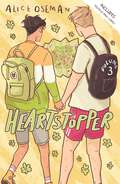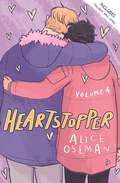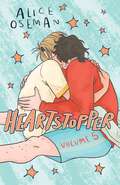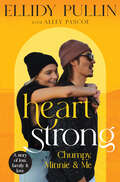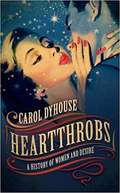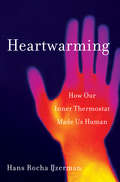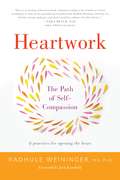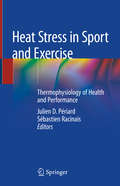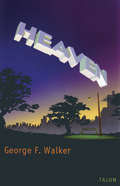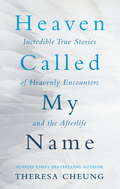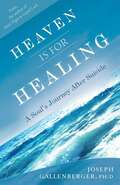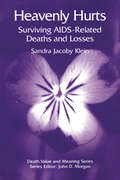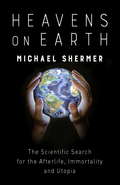- Table View
- List View
Heart and Brain: An Awkward Yeti Collection (Heart And Brain Ser. #1)
by Nick Seluk The Awkward YetiBoasting more than two million pageviews per month, TheAwkwardYeti.com has become a webcomic staple since its creation in 2012. In addition to tons of fan favorites, Heart and Brain contains more than 75 brand new comics that have never been seen online. From paying taxes and getting up for work to dancing with kittens and starting a band, readers everywhere will relate to the ongoing struggle between Heart and Brain.
Heart and Soul: Living the Joy, Truth and Beauty of Your Intimate Relationship
by Daphne Rose KingmaThe most precious gift any relationship can offer is the opportunity for spiritual growth-for deeper intimacy, transcendent moments, and emotional healing. In the tradition of her best-selling book True Love, Daphne Rose Kingma's newest book, Heart & Soul, takes you on a journey through love's varied and beautiful corridors. Her exuberant, wise, and accessible insights show how our intimate relationships can be an infinite source of strength and happiness. With over 500,000 copies of her books in print, DAPHNE ROSE KINCMA is a well-known relationship expert. A therapist for more than 25 years, she lives in Santa Barbara, California.
Heart and Soul: The Therapeutic Face of Philosophy
by Chris MacePhilosophy's traditional concerns with the nature of knowledge, good conduct and the self cannot be ignored by psychotherapists, while the growth of psychotherapy and psychoanalysis have had a profound impact on philosophy. The essays in the books cover topics central to both psychotherapy and philosophy such as the nature of the self, motivation and subjectivity; the limits of certainty and objectivity in interpersonal situations; and the scope of narrative, dialogue and of therapy itself. Contributions draw on a wide range of different philosophical approaches and examine how they can deepen our understanding of the processes involved in different types of psychotherapy in a wide range of clinical settings.
Heart of Development, V. 1: Early and Middle Childhood
by Mark McConville Gordon WheelerIn these groundbreaking new collections, the reader will find an exciting, boad-ranging selection of work showing an array of applications of the Gestalt model to working with children, adolescents, and their families and worlds. From the theoretical to the hands-on, and from the clinical office or playroom to family settings, schools, institutions, and the community, these chapters take us on a rewarding tour of the vibrant, productive range of Gestalt work today, always focusing on the first two decades of life. With each new topic and setting, fresh and creative ideas and interventions are offered and described, for use by practitioners of every school and method.
Heart of Development, V. 2: Adolescence
by Mark McConville Gordon WheelerIn these groundbreaking new collections, the reader will find an exciting, boad-ranging selection of work showing an array of applications of the Gestalt model to working with children, adolescents, and their families and worlds. From the theoretical to the hands-on, and from the clinical office or playroom to family settings, schools, institutions, and the community, these chapters take us on a rewarding tour of the vibrant, productive range of Gestalt work today, always focusing on the first two decades of life. With each new topic and setting, fresh and creative ideas and interventions are offered and described, for use by practitioners of every school and method.
Heart to Heart: How Your Emotions Affect Other People (Studies in Emotion and Social Interaction)
by Brian ParkinsonDo emotions happen inside separate hearts and minds, or do they operate across the spaces between individuals? This book focuses on how emotions affect other people by changing their orientation to what happens in the social world. It provides the first sustained attempt to bring together literature on emotion's social effects in dyads and groups, and on how people regulate their emotions in order to exploit these effects in their home and work lives. The chapters present state-of-the-art reviews of topics such as emotion contagion, social appraisal and emotional labour. The book then develops an innovative and integrative approach to the social psychology of emotion based on the idea of relation alignment. The implications not only stretch beyond face-to-face interactions into the wider interpersonal, institutional and cultural environment, but also penetrate the supposed depths of personal experience, making us rethink some of our strongly held presuppositions about how emotions work.
Heart, Brain and Mental Health Disparities for LGBTQ People of Color
by James J. GarcíaThis timely edited collection presents a holistic and biopsychosocial analysis of LGBTQ People of Color well-being, focused on heart, brain, and mental health, and employs a unique incorporation of minority stress, intersectionality, and allostatic load frameworks.Bringing together established and emerging academics, its authors present a critical analysis of the latest research that encompasses the study of both risk and resilience factors in LGBTQ People of Color health. Across the book, they highlight the precise nature of the behavioral health disparities experienced by these communities, but further, they reveal the unique roles of intersectional discrimination and structural stigma as mechanisms for these disparities.With chapters also dedicated to federal policies and public health, this multidisciplinary work marks a seminal contribution that will pave the way for further advances in research, theory, and practice. It offers a valuable resource on an understudied population that will appeal to researchers, practitioners and policy makers in the fields of health psychology, public health, epidemiology, sociology, health sciences and medicine.
Heartfelt Parenting: Using the Neuroscience of Connection To Nurture Your Children for Resilience and Wellbeing
by Shelly ChauhanDrawing on current powerful neuroscience, this book equips you with a deep insight into how your interconnected brain, mind and body shapes your capacity for heartfelt connection, emotional regulation and compassion, and the compelling influence this has on your child's developing mind.We know, based on established brain science, that children develop well in the care of parents who can regulate and express their own emotions effectively, who are present and attentive rather than in 'autopilot' mode, and who show warmth, empathy and compassion along with the requisite level of authority towards them. But in this day and age of relentless mental overload, busy schedules and constant stimulation, many parents know how difficult it can be to exude the sense of openness, warmth and connection that children need to develop well. The last thing parents need is yet more prescriptive advice about what you should and shouldn't think, do or say as a parent, so this this book helps you understand, in a tangible way, how to feel relaxed, open and compassionate when you are around your children. This is a vital ingredient in parenting, because this feeling state, involving your brain, nervous system, heart, facial expressions and voice, deeply calms your children, enables them to listen to you and respect your rules, and nourishes their brains for life-long resilience, empathy, self-acceptance and authenticity. Shelly Chauhan's approach removes some of the stress and complexity that parenting seems to involve these days and turns it into the intuitive, natural and enjoyable process it is able to be.
Hearts of Darkness: Serial Killers, the Behavioral Science Unit, and My Life as a Woman in the FBI
by Jana MonroeFor fans of Mindhunter and Criminal Minds, a chilling account of a woman facing down serial killers as one of the first female profilers of the FBI Behavioral Sciences Unit and real-life model for The Silence of the Lambs's Clarice Starling'Jana Monroe is the single most influential woman to ever serve in the FBI.' -Joe Navarro, bestselling author of What Every BODY Is Saying The gripping true account of one woman's encounters with some of the darkest criminal minds in history.Jana Monroe was no ordinary cop: over the course of her career she consulted on more than 850 homicide cases. Through her work, she crossed paths with Ted Bundy, Jeffrey Dahmer, Edmund Kemper, Aileen Wuornos, and hundreds of other murderers.Over the course of an utterly astonishing career in law enforcement and intelligence analysis, Monroe has come face-to-face with hundreds of the darkest criminals in American history. Her notoriety even led her to become the person whom the character of Clarice (Jodie Foster) in The Silence of the Lambs was modelled, and she even trained Foster for the role.Hearts of Darkness is Monroe's incredible story, stepping out from the shadows to tell a range of gripping, sometimes gruesome, and always remarkable tales from the top moments of a life fighting the evil among us.
Hearts of Darkness: Why Kids Are Becoming Mass Murderers and How We Can Stop It
by William J. Birnes John LiebertFrom Sandy Hook, Connecticut, to Aurora, Colorado, to Tucson, Arizona, this nation has been racked from coast to coast with mass shootings perpetrated by criminals with sick minds. Authors Dr. Liebert and Dr. Birnes believe the increase in violence is an epidemic and dig deep into the causes of mental illness to determine what exactly is going on with these individuals and society as a whole, and what action can be taken to slow this frightening trend toward mass violence.Dr. Liebert and Dr. Birnes believe that many mass suicides are predictable and preventable. Dr. Liebert uses his extensive experience in psychopathology and criminal psychology to describe how clinicians can identify the behaviors of potential suicidal mass killers and possibly prevent their crimes if they read the warning signs when legal opportunities present themselves, such as when recurrent domestic violence or psychotic communications are reported to authorities. The authors also discuss the influence of media-particularly violent video games-and how the evolution of American culture affects suicidal mental illness. With startling statistics, fascinating case studies, and practical, no-nonsense solutions, the authors present a groundbreaking and compelling treatise on violence in America.
Heartsong Cottage: A heartwarming, uplifting, feel-good romance series (Eternity Springs)
by Emily MarchIf you love Robyn Carr's Virgin River, don't miss Emily March's warm, uplifting Eternity Springs series!Heartsong Cottage is the heartwarming tenth novel in New York Times bestselling author Emily March's warm and uplifting romance series about a small town with a big heart. For fans of Debbie Macomber, Holly Martin and Sheryl Woods.Haunted by the loss of his wife and son, Daniel Garrett left the police force to devote his life to finding missing children. Yet it's not until he meets a beautiful, intriguing woman at a wedding in Eternity Springs that he glimpses a way to put the past behind him. Since her fiance's death, Shannon O'Toole has created a quiet life for herself restoring Victorian cottages. Romance is the last thing on her mind - until she meets Daniel, who makes her want to share her long-held secrets. But could getting involved with a detective bring unwanted danger into Shannon's life? And is it worth the risk for a second chance at love?Escape to Eternity Springs, a little piece of heaven in the Colorado Rockies, with the other books in the series, Hummingbird Lake, Heartache Falls, Mistletoe Mine, Lover's Leap, Nightingale Way, Reflection Point, Miracle Road, Dreamweaver Trail, Teardrop Lane, Heartsong Cottage, Reunion Pass, Christmas In Eternity Springs.
Heartsounds: The Story of a Love and Loss
by Martha Weinman LearThe national bestseller and undying testament of a wife&’s love for her husband as he embarks on the fight of his life. On a story assignment in France for the New York Times Magazine, Martha Weinman Lear has just escaped tourist-infested Cannes for a quiet pension in the hills behind the Riviera when she gets the call from New York. Her husband has suffered a massive heart attack and is in the hospital. Harold Lear, a fifty-three-year-old urologist and leader in the field of human sexuality research, suddenly finds himself in the helpless role of the patient. Ripping into the Lears&’ lives and marriage, Hal&’s coronary disease sends them on a journey through New York City&’s medical maze. With bittersweet poignancy, Lear chronicles her husband&’s valiant efforts to combat his sickness as more heart attacks and devastating postsurgical complications befall him. A stunning work of medical drama and journalism, Heartsounds is above all the gripping story of a passionate, enduring love.
Heartstopper Volume 3: The bestselling graphic novel, now on Netflix! (Heartstopper #3)
by Alice Oseman*Now an acclaimed live-action Netflix series!**Heartstopper Volumes 1-4 out now, Volume 5 coming soon.* Boy meets boy. Boys become friends. Boys fall in love. An LGBTQ+ graphic novel about life, love, and everything that happens in between: this is the third volume of the bestselling HEARTSTOPPER series. *Includes exclusive Tao/Elle mini-comic!*'Absolutely delightful. Sweet, romantic, kind. Beautifully paced. I loved this book.' RAINBOW ROWELL, author of Carry OnCharlie didn't think Nick could ever like him back, but now they're officially boyfriends. Nick's even found the courage to come out to his mum. But coming out isn't just something that happens once - there's Nick's older brother, and a school trip to Paris, not to mention all the other friends and family - and life can be hard, even with someone who loves you by your side. As their feelings get more serious, Charlie and Nick will need each other more than ever before. By Alice Oseman, winner of the YA Book Prize, Heartstopper is about love, friendship, loyalty and mental illness. It encompasses all the small moments of Nick and Charlie's lives that together make up something larger, which speaks to all of us. Contains discussions about mental health, eating disorders and a reference to past self-harm. 'The queer graphic novel we wished we had at high school.' Gay TimesHeartstopper was Children's #1 bestseller in the TCM chart on 23 April 2022.
Heartstopper Volume 4: The bestselling graphic novel, now on Netflix! (Heartstopper #4)
by Alice Oseman*Now an acclaimed live-action Netflix series!**Heartstopper Volumes 1-4 out now, Volume 5 coming soon.* Boy meets boy. Boys become friends. Boys fall in love. The bestselling LGBTQ+ graphic novel about life, love, and everything that happens in between: this is the fourth volume of the HEARTSTOPPER series. *Includes exclusive Teachers mini-comic*'Absolutely delightful. Sweet, romantic, kind. Beautifully paced. I loved this book.' RAINBOW ROWELL, author of Carry OnCharlie didn't think Nick could ever like him back, but now they're officially boyfriends. Charlie's beginning to feel ready to say those three little words: I love you. Nick's been feeling the same, but he's got a lot on his mind - not least coming out to his dad, and the fact that Charlie might have an eating disorder. As summer turns to autumn and a new school year begins, Charlie and Nick are about to learn a lot about what love means.By Alice Oseman, winner of the YA Book Prize, Heartstopper is about love, friendship, loyalty and mental illness. It encompasses all the small moments of Nick and Charlie's lives that together make up something larger, which speaks to all of us.Contains discussions about mental health, eating disorders, and references to self-harm.'The queer graphic novel we wished we had at high school.' Gay Times*Shortlisted for Book of the Year in the British Book Awards*Heartstopper was Children's #1 bestseller in the TCM chart on 23 April 2022.
Heartstopper Volume 5: The bestselling graphic novel, now on Netflix! (Heartstopper #5)
by Alice Oseman*Now an acclaimed live-action Netflix series!*Boy meets boy. Boys become friends. Boys fall in love. The bestselling LGBTQ+ graphic novel about life, love, and everything that happens in between: this is the fifth volume of the much-loved HEARTSTOPPER series.'Absolutely delightful. Sweet, romantic, kind. Beautifully paced. I loved this book.' RAINBOW ROWELL, author of Carry OnNick and Charlie are very much in love. They've finally said those three little words, and Charlie has almost persuaded his mum to let him sleep over at Nick's house ... But with Nick going off to university next year, is everything about to change?By Alice Oseman, winner of the YA Book Prize, Heartstopper encompasses all the small moments of Nick and Charlie's lives that together make up something larger, which speaks to all of us. Contains discussions around mental health and eating disorders, and sexual references.'The queer graphic novel we wished we had at high school.' Gay Times
Heartstrong
by Ellidy Pullin'If not with you, then for you.'It was a perfect Wednesday morning when Alex 'Chumpy' Pullin kissed his partner, Ellidy, goodbye to go spearfishing. Most days Ellidy would go to the beach too, but that day she didn't. Later, there was a knock at the door. A man had been found unconscious on the ocean floor. It was Chumpy. From that moment, Ellidy's world stopped. There was deep grief, disbelief and then the gradual realisation that this was real. Ellidy's partner of eight years, a World Champion snowboarder, a man of energy and music, was gone. And so was the life they had built together and the dream of the child they had been trying for. In the hours that followed a suggestion was made: did Ellidy want to harvest Chumpy's sperm and try for the baby they both wanted so deeply? There was a ticking clock and the need to discuss with family and friends. They had thirty-six hours before it would be too late . . . Heartstrong is an unforgettable book about love, joy, grief, hope and finding a way to keep going in the darkest of times.
Heartthrobs: A History of Women and Desire
by Carol DyhouseFrom dreams of Prince Charming or dashing military heroes, to the lure of dark strangers and vampire lovers; from rock stars and rebels to soulmates, dependable family types, or simply good companions, female fantasies about men tell us a great deal about the history of women. In Heartthrobs, Carol Dyhouse draws upon literature, cinema, and popular romance to show how the changing cultural and economic position of women has shaped their dreams about men. <p><p> When girls were supposed to be shrinking violets, passionate females risked being seen as 'unbridled', or dangerously out of control. Change came slowly, and young women remained trapped in a double-bind: you may have needed a husband in order to survive, but you had to avoid looking like a gold-digger. Show attraction too openly and you might be judged 'fast' and undesirable. Education and wage-earning brought independence and a widening of horizons for women. <p><p> These new economic beings showed a sustained appetite for novel-reading, cinema-going, and the dancehall. They sighed over Rudolph Valentino's screen performances as tango-dancer or Arab tribesman and desert lover. Women may have been ridiculed for these obsessions, but, as consumers, they had new clout. This book reveals changing patterns of desire, and looks at men through the eyes of women.
Heartwarming: How Our Inner Thermostat Made Us Human
by Hans Rocha IJzermanAn illuminating investigation of core body temperature regulation and its powerful effect on human civilization. A hot cup of tea, coffee, or cocoa is calming and comforting—but how can holding a warm mug affect our emotions? In Heartwarming, social psychologist Hans Rocha IJzerman explores temperature through the long lens of evolution. Besides breathing, regulating body temperature is one of the most fundamental tasks for any animal. Like huddling penguins, we humans have long relied on one another to maintain our temperatures; over millennia, this instinct for thermoregulation has shaped our lives and culture. Temperature contributed to our evolution—our upright walking, our loss of fur, and our big brains—and now continues to affect our lives in unexpected ways, and the link from a warm mug to our emotions is anything but straightforward. Studies have shown, for example, that a chilly deliberation room can predispose a jury to convict and that a cold day can make us more likely to buy a house. Our mind-body connection works the other way, too: thinking about friendly or caring people can make us feel warmer. Understanding how we subconsciously strive to keep our temperature in an optimal range can help us in our relationships, jobs, and even in the world of social media. As IJzerman illuminates how temperature affects human sociality, he examines fascinating new questions: How will climate change impact society? Why are some people chronically cold, and others overheated? Can thermoregulation keep relationships closer, even across a distance? The answers offer new insights for all of us who want to better understand our bodies, our minds, and each other. Heartwarming takes readers on an engaging journey through the world, seen from the perspectives of coldness and warmth.
Heartwork: The Path of Self-Compassion 9 Practices for Opening the Heart
by Jack Kornfield Radhule WeiningerNine simple mindfulness practices anyone can use to generate compassion--toward oneself, others, and the world--and to live from that place of intelligent kindness in the face of life's difficulties.Compassion is the urge to understand and alleviate the suffering of another being. And if that being happens to be you, then the technique called self-compassion can be the greatest of blessings—for the compassion you learn to apply to yourself naturally extends to all the other people in your life. With the nine simple mindfulness practices she presents here, Radhule Weininger provides a step-by-step course in self-compassion. Using stories drawn from her own life and those of others she shows that, with the right intention and practice, we can all deepen our capacity to respond skillfully to our own suffering and thus to that of others and our world.
Heat Stress in Sport and Exercise: Thermophysiology of Health and Performance
by Julien D. Périard Sébastien RacinaisThe book is designed to provide a flowing description of the physiology of heat stress, the illnesses associated with heat exposure, recommendations on optimising health and performance, and an examination of Olympic sports played in potentially hot environmental conditions. In the first section the book examines how heat stress effects performance by outlining the basics of thermoregulation and how these responses impact on cardiovascular, central nervous system, and skeletal muscle function. It also outlines the pathophysiology and treatment of exertional heat illness, as well as the role of hydration status during exercise in the heat. Thereafter, countermeasures (e.g. cooling and heat acclimation) are covered and an explanation as to how they may aid in decreasing the incidence of heat illness and minimise the impairment in performance is provided. A novel and particular feature of the book is its inclusion of sport-specific chapters in which the influence of heat stress on performance and health is described, as well as strategies and policies adopted by the governing bodies in trying to offset the deleterious role of thermal strain. Given the breadth and scope of the sections, the book will be a reference guide for clinicians, practitioners, coaches, athletes, researchers, and students.
Heaven
by George F. WalkerFive instantly recognizable multicultural characters play out their coincidental relationships in a contemporary paradise-a park on the outskirts of a city. The pursuit of their personal goals, usually considered as good and worthwhile in our society, pits each of these characters irrevocably against each other, and good intentions are carried to their absurd extremes. Cast of 4 men, 2 women.
Heaven Called My Name: Incredible true stories of heavenly encounters and the afterlife
by Theresa CheungAn inspiring and moving collection of true encounters with the afterlife from the author of the Sunday Times bestsellers An Angel Called My Name and An Angel Healed MeHeaven Called My Name is a compelling collection of incredible true stories from people who believe they have heard the voice of heaven and reveals messages of comfort, guidance and inspiration. Using first-hand accounts from ordinary people whose lives have been forever transformed by an afterlife encounter, as well as her own experiences and insights, Theresa Cheung will answer the eternal questions that we all ask ourselves at some point in our lives, regardless of whether we follow a religion or not.*Is there a meaning and a purpose to my life?*What is my calling or my destiny? *Is there life after death?*Can I talk to a departed loved one in heaven?*Does heaven watch over me?The moving and honest accounts in Heaven Called My Name are proof that extraordinary things can and do happen to ordinary people, guiding and transforming their lives in the process.
Heaven is for Healing: A Soul's Journey After Suicide
by Joe GallenbergerWhen his beloved brother Peter committed suicide,psychotherapist Dr. Joe Gallenberger met his overwhelming grief with courage, and open-minded curiosity. Using tools learned at The Monroe Institute, and affirming that “love can pierce any veil,” he was soon able to contact Peter on the other side. Joe's experience on how to move through devastating loss in a transformational way, and what he learned about the other side, were shared in Joe's acclaimed book, Brothers Forever. <p><p>Heaven Is for Healing envelops and expands upon this, taking up the story twenty years later. He reveals Peter's two-decade journey on the other side, and how Peter, with the most loving assistance, has progressed in healing from his suicide and how he is moving into new options for a next life. He explores the variety of ways suicides are helped to recover and then continue their growth, depending upon their condition when they arrive on the other side. <p><p>Joe also shares how this family crisis challenged him over these twenty years. He describes his own struggles with depression, and of how he rose from grief and made it his life's work to help other people live their lives to their fullest potential. He shares the tools he has created to move people from sadness and limitation into abundance and joy.
Heavenly Hurts: Surviving AIDS-related Deaths and Losses (Death, Value and Meaning Series)
by Sandra Jacoby Klein"Heavenly Hurts Surviving AIDS-Related Deaths and Losses" imparts vital information for anyone touched by deaths and losses of HIV/AIDS. In the AIDS pandemic, efforts are focused on persons living with AIDS (PLWA). Neglected are professional and non-professional caregivers, families, and friends. They are surviving deaths of loved ones from AIDS-related illness, or are dealing with multiple losses of HIV/AIDS. "Heavenly Hurts" provides guidance, support and coping skills, along with discussions of death language; AIDS grief; death in the workplace; and cultural and spiritual issues around death.
Heavens on Earth: The Scientific Search for the Afterlife, Immortality and Utopia
by Michael ShermerA scientific exploration into humanity's obsession with the afterlife and the quest for immortality from the bestselling author and sceptic Michael ShermerIn his most ambitious work yet, Shermer sets out to discover what drives humans' belief in life after death. For millennia, the awareness of our own mortality and failings has led to religions concocting comforting notions of an afterlife, of heaven and hell, utopias and dystopias, and of the perfectibility of human nature.Heavens on Earth explores the numerous manifestations of the afterlife - a place where souls might go after the death of the physical body. Religious leaders have toiled to make sense of this place that a surprisingly high percentage of people believe exists, but from which no one has ever returned to report what it is really like.This is one of the most profound questions of the human condition and has long driven philosophers and theologians to try to understand the meaning and purpose of life for mortal beings, and how we can transcend mortality. Shermer details recent scientific attempts to achieve immortality by radical life extentionists, extropians, transhumanists, cryonicists and mind-uploaders, along with utopians who have attempted to create heaven on earth. Heavens on Earth concludes with an uplifting paean to purpose and progress and what we can do in the here-and-now, whether or not there is a hereafter.
